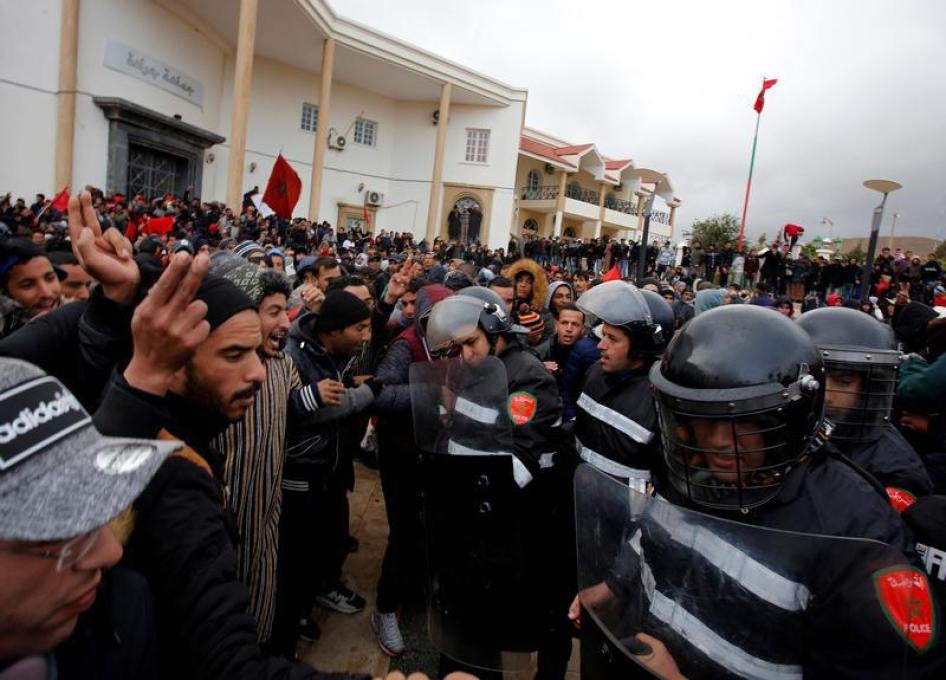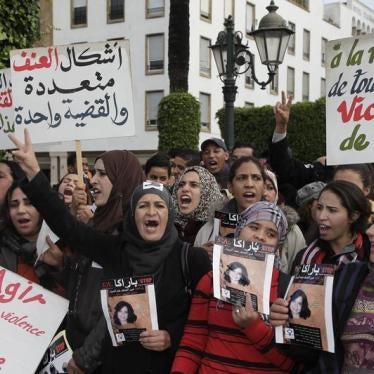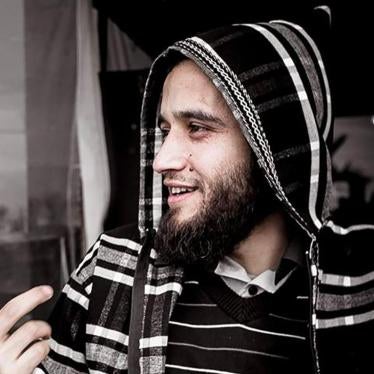(Tunis) – Moroccan police responded to March 2018 protests in the impoverished mining town of Jerada with weeks of repression, Human Rights Watch said. Security forces used excessive force against protesters, recklessly drove a police van into a 16-year-old boy, who was severely injured, and arrested protest leaders and reportedly mistreated them in detention.
The repression mirrors the response to similar protests over economic grievances and perceived government neglect in 2016-2017, in the Rif region, also in northern Morocco. The authorities said protesters in Jerada were arrested after the protests turned violent and protesters damaged property. While some protesters threw stones on March 14 and authorities claim they also committed acts of arson, this would not justify the use of indiscriminate and excessive force, or the arrests that began before that date. It would also not justify the suppression of peaceful protests or the alleged mistreatment of detainees.
“The repression in Jerada has gone well beyond an effort to bring allegedly violent protesters to justice,” said Sarah Leah Whitson, Middle East and North Africa director at Human Rights Watch. “It looks like it is about suppressing the right to peacefully protest social and economic conditions.”
Human Rights Watch researchers who visited Jerada on April 4 were stopped and interrogated at two security checkpoints, then closely followed all day by a car containing three men in civilian clothes, apparently prompting contacts to cancel scheduled meetings. The researchers observed a heavy presence of security forces, with armed uniformed police posted in every major street and square of the small city, and more than 100 police vans in the vicinity. The researchers met human rights activists and Abdelhak Benkada, a lawyer for many of the protesters, in the nearby city of Oujda on April 3.
In one incident on March 14 that was captured in a video that went viral on social media, police vehicles sped into a protest site, one of them hitting a 16-year-old boy and severely injuring him. Beginning that day, police agents broke into houses in Jerada without showing warrants, beat several men upon arrest, and broke doors and windows, activists and Benkada told Human Rights Watch.
The same sources said the arrests have continued, with 23 arrests reported most recently between May 12 and 27. As of May 31, 69 protesters, including three minors, were in prison or in pretrial detention. Four, including two protest leaders, have been in solitary confinement for more than two months, said Benkada.
The protests in Jerada, a city of 40,000, began after the accidental death of two workers on December 22, 2017, inside a coal pit they were mining in reportedly poor and dangerous conditions. On March 13, the government issued a warning that it has the authority to ban “illegal demonstrations in public spaces.”
The following day, groups of protesters, mostly coal workers and their families, gathered in a forest near the Village Youssef neighborhood. For the first time since the protests began, the local rights activists said, some protesters threw rocks at security forces who tried to disperse them. The confrontation spilled onto a nearby esplanade.
In an email sent to Human Rights Watch on May 30, Morocco’s Interministerial Delegation for Human Rights (also known by its French acronym, DIDH) said six police cars were burned and 280 security force members were injured. Members of the local branch of the Moroccan Association for Human Rights (AMDH) said there were no more than 100 protesters in the forest, a number that probably dwindled by the time the situation evolved into confrontation on the esplanade, the activists added. “The number of 280 injured security force members seems very exaggerated to me,” said Jawad Tlemsani, president of AMDH’s Oujda section. “During the trials, which we observed, about 20 of them testified and presented medical certificates.” Tlemsani added that several protesters were injured, but many of them did not seek treatment in Jerada’s public hospital for fear of being arrested.
The boy hit by the police van was Abdelmoula Zaiqer, his mother, Najat Mahjoubi, told Human Rights Watch. A video filmed that day and authenticated by Human Rights Watch shows at least four police vans driving recklessly fast where protesters were standing, in an apparent attempt to scare them into scattering. The video shows a group of protesters falling, and a police van hitting at least one of them.
It is unclear whether Zaiqer was among that group. He suffered trauma to the head, hips, feet, and vertebrae, according to a hospital document seen by Human Rights Watch, which states that Zaiqer was victim of a “car accident with a van.” The DIDH told Human Rights Watch that Zaiqer was “accidentally wounded.” Mahjoubi said that the authorities have pressured her to avoid contacts with journalists and rights activists, and that she has been followed more than once by men in civilian clothing she suspected were police.
A car with three men in civilian clothes also followed Human Rights Watch staff when they attempted to visit Zaiqer and his mother on April 6 in a hospital near Casablanca to which the teenager had been transferred. As of May 31, Mahjoubi said, doctors had been unable to determine whether Zaiqer will walk again.
After the March 14 confrontation, security forces arrested 88 men, including eight minors, who were prosecuted under various charges including violence against police officers, destruction of public property, possession of weapons, armed gathering, and burning vehicles. Ten have been sentenced: four to prison sentences ranging from six to 12 months, and the other six to suspended sentences from six months to one year.
Benkada, who represents 30 Jerada protesters, said that the police used excessive force in many arrests. Mohamed and Abdessamad Hachbai, who are brothers, told Benkada that security forces broke down the door of their house and arrested and beat them.
Tahar Kihel, who appeared in the Oujda Court of Appeals with a bandage on his head on March 17, told the investigating judge the bandage covered a wound from a police beating, Benkada said. The investigative judge neither commented nor opened an investigation, he added.
Khalid Ait El Ghazi, who was arrested on March 14 before the confrontation, told a judge in Oujda’s Court of First Instance on March 19 that security force members hit him on the head upon arrest, Benkada said. The judge denied his request for a medical examination. The lawyer said none of these men had been shown an arrest warrant or read their rights, as required under Morocco’s Constitution.
Human Rights Watch tried to contact family members of various imprisoned protesters, but local sources who promised to establish contacts backed off after learning that the researchers had been closely monitored during their April 4 visit to Jerada.
Police arrested four men, including protest leaders Mostafa Dainine, 28, and Amine Lamqallech, 27, days before the March 14 confrontation. On April 10, Dainine was sentenced to 10 months in prison on charges stemming from a traffic accident unrelated to the protests. Lamqallech and the other two, Abdelaziz Boudchiche, 24, and Tarik El Amri, 34, were sentenced to 18, 12, and 6 months, respectively, under various charges including rebellion and harboring a fugitive. Since their arrest in March, they have been locked in their cells 23 hours a day, Benkada said.
Dainine and Lamqallech told him that police forces kicked them on their heads, backs, and necks while arresting them. They told the prosecutor of Oujda’s first instance court and the appeals court’s investigative judge about their injuries, but neither agreed to have them examined, Benkada said.
In its email to Human Rights Watch, the DIDH denied that the two men told the court that they had been beaten or had requested a medical examination.
According to the United Nations Standard Minimum Rules on the Treatment of Prisoners, also known as the “Mandela Rules,” prolonged solitary confinement, defined as spending 22 hours per day without meaningful human contact for more than 15 consecutive days, may amount to cruel, inhuman, or degrading treatment and should be prohibited. During their trial, the four men asked the judge to order an end to their isolation in prison but their requests were denied, according to their lawyer. The DIDH denied in its communication of May 30 that Dainine, Boudchiche, El Amri, and Lamqallech were “currently” in isolation, saying that the first three were in group cells and the last one was in an individual cell at his own request.









